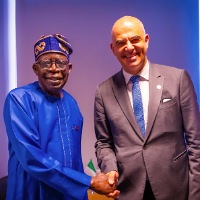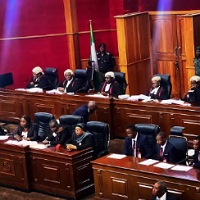Finance
Alleged N13.6bn scam: Yuguda, Bafarawa, son beg court for bail

ABUJA — Justice Peter Affen of the Abuja High Court at Maitama, yesterday, adjourned till Monday to decide whether the former Minister of Finance, Bashir Yuguda, former governor of Sokoto State, Attahiru Dalhatu Bafarawa and his son, Sagir Attahiru, should be released on bail pending their trial.
The trio are answering to a 22-count criminal charge alongside the embattled erstwhile National Security Adviser, NSA, Col. Sambo Dasuki, retd, and the former Director of Finance in the Office of the NSA, Mr. Shuaibu Salisu.
Meanwhile, after two days at the Kuje Prison in Abuja, the Chairman emeritus of DAAR Communications Limited, High Chief Raymond Dokpesi, yesterday, regained his freedom.
The Economic and Financial Crimes Commission, EFCC, alleged that the accused persons connived and diverted over N13.6billion from the office of the NSA, prior to the 2015 general elections.
A company that the anti-graft agency said served as conduit pipe for the alleged illegal diversion of the funds, Dahaltu Investment Limited, was also charged before the court as the 4th accused person.
All the accused persons had on Tuesday, pleaded not guilty to the charge, even as they separately prayed the court to okay their release on bail pending hearing and determination of the criminal case against them.
They predicated their bail applications on provisions of sections 158, 162, 165, 167 and 168 (b) of the Administration of Criminal Justice Act, 2015, as well as section 36(5) (6) of the 1999 constitution.
The accused persons, through their lawyers, insisted that the charge slammed against them by the anti-graft agency were bailable.
Whereas Dasuki, through his counsel, Ahmed Raji, SAN, urged the court to grant him bail on self recognition, Bafarawa and his son, Sagir, prayed the court to grant them bail on health grounds.
While Barafawa told the court that his health had badly deteriorated owing to his continued detention, his son, told the court that he has Ulcer.
Both father and son addressed the court, yesterday, through two different Senior Advocates of Nigeria, Chief J.O. Olatoke and Mr. H. O. Afolabi. Likewise, the 3rd accused, Salisu, prayed the court for bail, saying he has been in detention for the past 31 days.
Meantime, the EFCC, yesterday, urged the court to refuse their bail requests and order accelerated hearing of the case against them.
Th e Commission, through its lawyer, Mr. Rotimi Jacobs, SAN, told the court that the defendants have wide influence and affluence to intimidate, harass and influence the proposed prosecution witnesses if released on bail.
EFCC insisted that the defendants will escape from Nigeria once out of detention.
It told the court that the applicants are also being investigated in respect of other criminal allegations.
The prosecuting agency, via an affidavit that was deposed to by one of its lead detectives, Mr. Hassan Saidu, told the court that the accused persons acquired “a large volume of assets with the proceeds of crimes”.
Saidu said his team was currently tracing the assets, “if released on bail the applicants will interfere with the assets tracing activities”, he added.
He further told the court that investigations revealed that the accused persons transferred large sums of monies outside Nigeria, saying they used part of the funds and acquired several assets in Dubai and London.
“That the prosecution is prepared to prove its case within the shortest possible time if the application is refused and the court orders accelerated hearing”, Saidu averred.
Jacobs, yesterday, argued that it would not be in the interest of justice for the court to admit any of the accused persons to bail.
After listening to all the parties yesterday, Justice Affen adjourned his ruling till Monday.
EFCC had alleged that the accused persons diverted funds budgeted for the fight against terrorism and insurgency in Nigeria.
It told the trial court that the funds were sequentially withdrawn from an account of the office of the NSA with CBN and other financial institutions.
“The funds were diverted for political campaign and shared to third parties who have nothing to do with the NSA”.
EFCC lawyer told the court that the accused persons have made confessional statements.
“My lord we are taking about monies running into billions of Naira”, Jacobs added.
Meanwhile, after two days at the Kuje Prison in Abuja, the Chairman emeritus of DAAR Communications Limited, High Chief Raymond Dokpesi, yesterday, regained his freedom.
A statement from his counsel, Chief Mike Ozehkome, SAN, said Dokpesi was released from prison custody having perfected all the conditions that were stipulated by trial Justice Gabriel Kolawole of the Federal High Court in Abuja.
Justice Kolawole had on Monday granted Dokpesi who is facing a six-count criminal charge that was entered against him by the EFCC, bail to the tune of N400milion.
The court, among other conditions, directed him to produce two sureties, as well as to surrender all his travelling documents to the Deputy Registrar of the high court.
Two of the charges against Bafarawa and the others read: “That you Col. Mohammed Sambo Dasuki (rtd), whilst being the National Security Adviser and Shuaibu Salisu whilst being the Director of Finance and Administration in the Office of the NSA, between 14th April, 2014, and 7th May, 2015, in Abuja, within the jurisdiction of this court, entrusted with dominion over certain properties to wit: an aggregate sum of N3,350,000,000 (Three Billion, Three Hundred and Fifty Million Naira) being part of the funds in the account of the office of the NSA with the Central Bank of Nigeria, committed criminal breach of trust in respect of the said properties when you transfered same to the account of Dalhatu Investment Limited with the United Bank of Africa Plc. purporting same to be payment for the supply of security equipment and you thereby committed an offence punishable under section 315 of the Penal Code Act, Cap 532, Vol. 4, LFN 2004.
“That you Dalhatu Investment Limited, Sagir Attahiru and Attahiru Dalhatu Bafarawa, between 14th April, 2014 and 17th May, 2015, in Abuja, within the jurisdiction of this court, dishonestly received stolen property, to wit: an aggregate sum of N3,350,000,000 (Three Billion, Three Hundred and Fifty Million Naira) into your account with the United Bank of Africa Plc from the account of the office of the NSA with the CBN, which belonged to the Federal Government of Nigeria and knowing the said sum to be stolen property but purporting same to be payment for the supply of security equipment and you thereby committed an offence punishable under section 317 of the Penal Code Act, Cap 532, Vol. 4, LFN 2004.
Vanguard-
Banking
CBN Denies Currency Devaluation

The Central Bank of Nigeria (CBN) has refuted claims of devaluing the.
Earlier reports suggested that the CBN had devalued the Naira, lowering its exchange rate from N631 to the dollar, compared to the previous day’s rate of N461.60 at the Importers and Exporters (I&E) window.
However, the Central Bank of Nigeria (CBN) released a statement on Thursday through its Acting Head of Corporate Communications, Dr. Isa Abdulmumin, categorizing the report as false information.
In the statement titled ‘CBN Has Not Devalued The Naira’, he said the attention of the apex bank was drawn to the news report by an Abuja based newspaper edition of June 1, 2023, titled “CB Devalues Naira To 630/51”.
However, the CBN stated categorically that the news report was replete with outright FALSEHOODS and destabilizing innuendos, ‘reflecting potentially willful ignorance of the said medium as to the workings of the Nigerian Foreign Exchange Market.’
“For the avoidance of doubt, the exchange rate at the Investors’ & Exporters (I&E) window traded this morning (June 1, 2023) at N465/USS1 and has been stable around this rate for a while.
“The public is hereby advised to ignore the news report by Daily Trust in its entirety, as it is speculative and calculated at causing panic in the market,” the CBN spokesman added.
He, therefore, advised media practitioners to verify their facts from the Central Bank of Nigeria before publishing in order not to misinform the public.
Banking
BREAKING: CBN Increases Interest Rate By 0.5%

The interest rate in Nigeria has been raised to 18.5 percent, up by 0.5 percent, from 18 percent where it was pegged in March 2023.
The Central Banks of Nigeria’s (CBN) Monetary Policy Committee (MPC) resolved to this effect at its third meeting of 2023 in Abuja, on Wednesday.
Governor, CBN, Godwin Emefiele, made the disclosure in the communiqué of the MPC’s meeting, thereafter.
While engaging the media at the end of the two-day meeting, Emefiele, said the committee voted to keep the asymmetric corridor at +100 and -700 basis points around the MPR.
In the view of the MPC, rising inflation rate is traceable to the high energy cost and challenges around the supply chain, among others, which lie outside the corridors of the CBN.
Emefiele said, “The current trend in price development would continue to be monitored by the bank with greater collaboration with fiscal authority to address the drivers of inflation.”
Biztellers reports that the CBN had effected six consecutive interest rate increases, which has seen the rate move from 11.5 percent in March 2022 to 18.5 percent in May 2023.
Finance
Dangers Lurk As Nigerians Resort To Refurbished Gas Cylinders

In Nigeria, people have been forced to come up with creative solutions to cope with the effects of inflation and the economic crisis.
These improvised strategies have not only helped individuals save money, but also enabled them to stay afloat during difficult times.
In a concerning development, the recent trend of boycotting the high cost of cooking gas cylinders in Nigeria may pose a greater risk to lives than it does in terms of saving money.
Economy&Lifestyle investigations have revealed that the soaring prices of gas cylinders have reached a point where it has become increasingly challenging for average households to afford them, let alone refill them with gas.
The situation is further exacerbated by the fact that the pump price of kerosene, which would typically serve as an alternative, has become prohibitively expensive.
Upon investigation, it was found that the prices of gas cylinders vary depending on their sizes. A 3kg gas cylinder is priced at N14,000, while a 5kg cylinder costs N16,000. The larger cylinders are even more costly, with a 6kg cylinder priced at N17,000 and a 12.5kg cylinder costing N19,000.
Additionally, the expense continues when it comes to filling these cylinders with cooking gas, as it costs N2,600 for a 3kg cylinder, N5,200 for a 6kg cylinder, N8,950 for a 10.5kg cylinder, and N10,650 for a 12.5kg cylinder.
Consequently, an average household that needs to replace a worn-out 5kg cylinder would have to come up with N20,250 to purchase a new cylinder and fill it with gas, which can be a difficult feat to achieve.
As a result, many people have resorted to refurbishing their old cylinders and trying to use them as best as they can. However, this approach poses a significant danger.
Mrs. Rukayat Adesoji, a trader, shared her experience regarding her gas cylinder, which had become rusted and could no longer stand upright since last month. Due to the exorbitant prices of purchasing new cylinders, she resorted to seeking the assistance of a welder.
The welder patched the legs of the cylinder, repainted it, and ever since then, she has been using the refurbished cylinder for her cooking needs.
She said ““My gas cylinder which was 6kg got rusted and no longer stands erect since last month. When I asked for the price, I was told it was N17, 500. I was discussing it with a friend who advised me to take it to a welder to paint it and construct a new stand. I heeded to her advice and at the end spent just N3, 000 to turn my cooking gas to a brand new.”
Apart from refurbishing cylinders, some people don’t even know when their cylinders will expire. Mrs. Mercy Opara, a hair stylist, falls in that category as she explained: “I am taking my gas cylinder to the welder to spray it for me. It just cost N1, 500.
“The cost of buying a new cylinder is high. I have been using my cylinder for over 7 years and I don’t even know the expiry date. I just pray God blesses me so that I can buy a new one. But this one I am managing will look neat after spraying it for another two years.”
Mr. Adekanbi Joseph, a wielder, said he paints cylinder and “To paint and rebuild a cylinder stand, I charge N4, 500. Many people come here to paint as a new cylinder is now very expensive to get.”
Highlighting the potential dangers of using refurbished cylinders, Mr. Benjamin Hope, the Chief Executive Officer of FKT Cooking gas and general goods, emphasized the risks involved.
He stated that even a brand new cylinder can pose a risk of explosion if the locks are not properly secured after use or if the cylinder filled with gas is moved from one location to another.
He said “A brand new cylinder can explode if the locks are not well keyed after using and if the cylinder filled with gas was moved from one place.
“There are many reasons for the high cost of gas cylinders in Nigeria. One is the cost of importation due to the exchange rate. Another is the increased migration from the use of kerosene to cooking gas which has necessitated increased demand for gas cylinders. You know that in such a case there will be increased importation of cylinders.”he added























